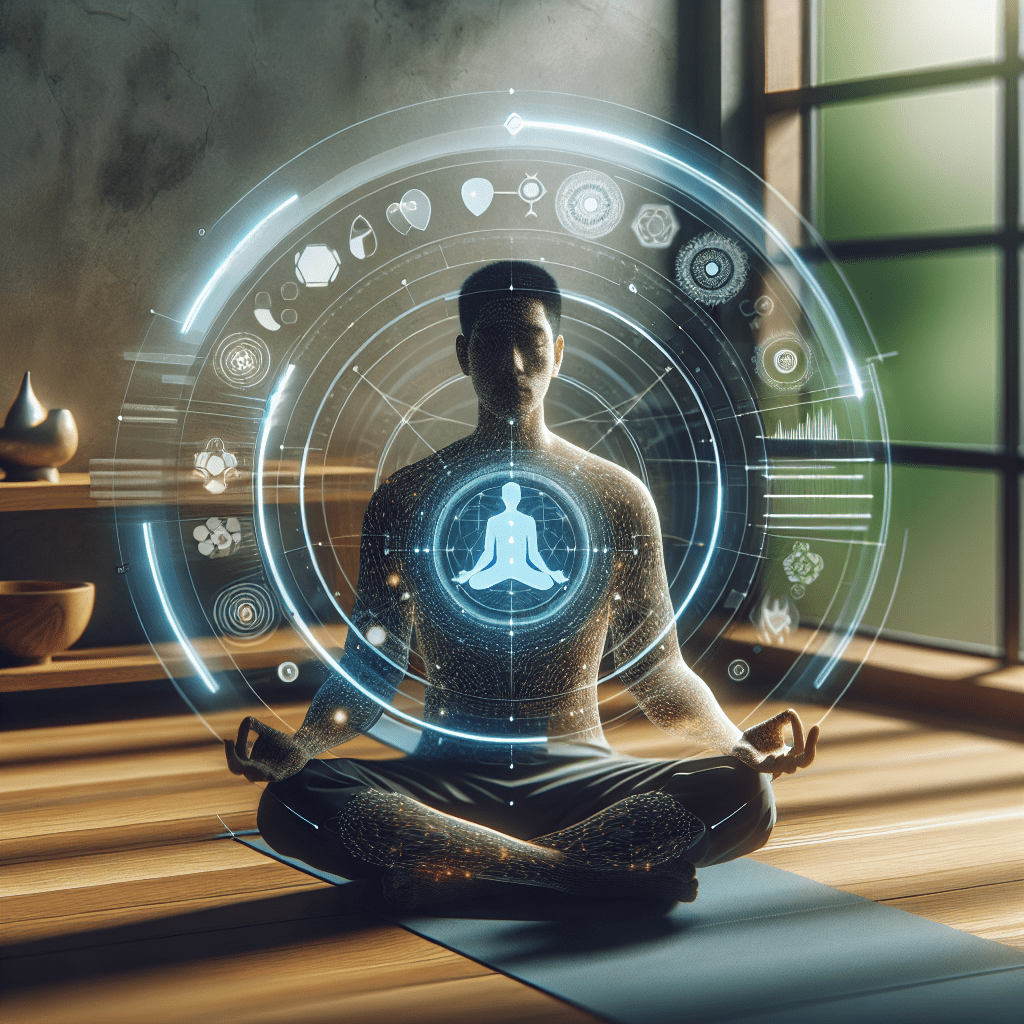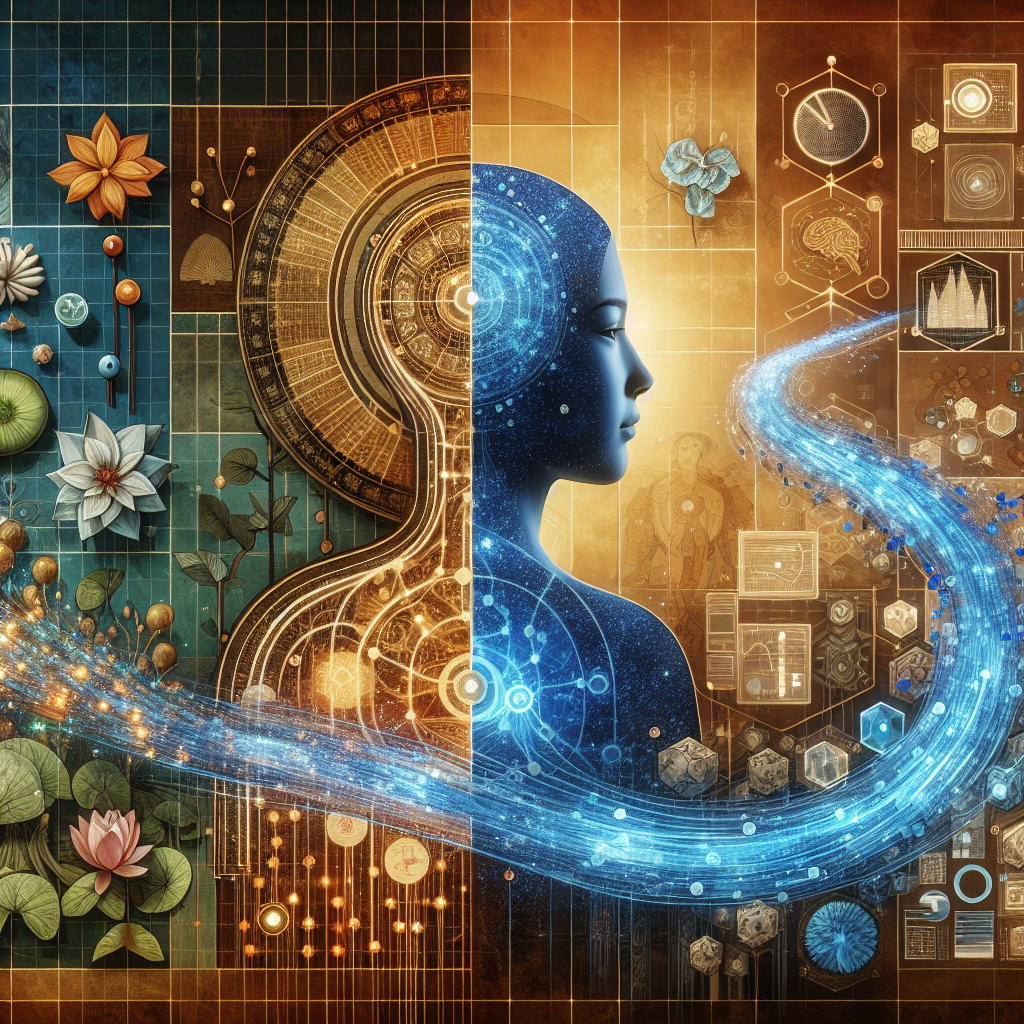In a world where technology seems to touch every aspect of our lives, wellness is no exception. Digital health coaching is emerging as a powerful fusion of time-tested healing wisdom and cutting-edge AI technology, creating a bridge between ancient practices and modern innovation. This exciting integration offers something truly special – personalized wellness guidance that honors traditional knowledge while leveraging the precision of artificial intelligence.
Imagine having both an ancient healer and a sophisticated algorithm working together to optimize your health journey. That’s essentially what today’s digital health coach provides. For those of us drawn to holistic approaches but living in a fast-paced digital world, this marriage of old and new presents an intriguing path forward.
The beauty of this combination lies in its comprehensiveness. While traditional wellness practices offer deep insights refined over centuries, AI brings adaptability and personalization that can make these ancient practices more accessible and relevant to our individual needs. Together, they create a wellness approach that’s both grounded in wisdom and responsive to our unique bodies and lifestyles.
Eastern Wellness Philosophies: The Foundation of Holistic Health
At the heart of many digital health coaching platforms lies the profound wisdom of Eastern wellness traditions. Traditional Chinese Medicine (TCM) and Ayurveda, developed over thousands of years, offer sophisticated frameworks for understanding health that extend far beyond the symptom-focused approach often seen in Western medicine.
TCM is built on the concept of qi (vital energy) flowing through meridians in the body, with health depending on balanced energy and harmony between opposing forces of yin and yang. The Five Element Theory classifies everything in nature – including our bodies – into wood, fire, earth, metal, and water, providing insights into our constitutional tendencies and health patterns.
“Eastern medicine views the body as an interconnected system where physical, emotional, and spiritual aspects cannot be separated,” explains Dr. Mei Lin, a TCM practitioner with 25 years of experience. “When we assess someone’s health, we look at the whole person – their diet, emotions, sleep patterns, and environment – not just isolated symptoms.”
Similarly, Ayurveda, India’s ancient healing system, categorizes individuals into doshas (Vata, Pitta, and Kapha) based on elemental compositions, offering personalized recommendations for achieving balance through diet, herbs, lifestyle practices, and seasonal adjustments.
What makes these Eastern approaches so compatible with AI-powered digital health coaching is their emphasis on patterns and relationships. AI excels at identifying patterns in complex data, making it ideally suited to work with these holistic frameworks. For instance, an AI system can analyze multiple factors like sleep quality, dietary choices, stress levels, and physical activity to recognize imbalances in a user’s constitutional type and suggest appropriate adjustments – much like a traditional practitioner would, but with greater precision and consistency.
🔍 Key Insight: Eastern medicine’s pattern-based approach to health perfectly complements AI’s pattern recognition capabilities, creating a powerful synergy that enhances both traditions.
The preventative focus of Eastern medicine also aligns perfectly with modern health coaching goals. Rather than waiting for illness to develop, both approaches aim to maintain balance and address subtle imbalances before they manifest as disease – a philosophy increasingly recognized as vital in our stress-filled modern world.
AI’s Revolutionary Role in Personalizing Wellness
Artificial intelligence is transforming digital health coaching by bringing unprecedented levels of personalization to wellness practices. Unlike one-size-fits-all health advice, AI systems can analyze vast amounts of individual data to create truly personalized recommendations that evolve as you do.
The power of AI in wellness lies in its ability to learn. By processing information about your sleep patterns, activity levels, dietary preferences, stress triggers, and even genetic predispositions, AI health coaches can identify subtle correlations that might escape human observation. This learning capability means your digital health coach becomes more attuned to your needs over time.
“What we’re seeing with AI in wellness is the ability to create highly individualized protocols based on a person’s unique biochemistry, lifestyle factors, and personal goals,” notes Dr. James Chen, who specializes in integrative medicine and digital health technologies. “This level of personalization was previously impossible at scale.”
Research published in the Journal of Medical Internet Research found that AI-enhanced wellness programs demonstrated 62% higher engagement rates and 47% better outcomes compared to standard approaches. This effectiveness stems from AI’s ability to deliver the right intervention at the right time, making recommendations when users are most receptive.
AI also helps overcome human biases in health coaching. While human coaches might unconsciously favor certain approaches based on their training or personal experience, AI systems can objectively evaluate multiple pathways to wellness based on evidence and individual response data.
For those drawn to Eastern wellness traditions, AI integration offers exciting possibilities. Rather than trying to fit into a general category, AI can analyze your specific constitution according to TCM or Ayurvedic principles with remarkable precision. For example, EASTCHI AI evaluates constitutional types through Five Element Theory, offering tailored nutrition plans and lifestyle recommendations that align with traditional Eastern medical theories while adapting to your unique needs.
💡 Did You Know? The EASTCHI AI system can analyze your specific constitution according to TCM principles with remarkable precision, offering tailored recommendations that would traditionally require years of practitioner training.
The technology also makes these ancient practices more accessible. Many people interested in Eastern wellness approaches struggle to find qualified practitioners or understand how to apply complex traditional concepts to their modern lives. Digital health coaches bridge this gap, translating ancient wisdom into practical, day-to-day guidance that fits contemporary lifestyles.
Proactive Wellness: Where Predictive AI Meets Preventative Eastern Philosophy
One of the most powerful synergies between AI and Eastern medicine lies in their shared emphasis on prevention. Eastern healing traditions have always prioritized maintaining balance to prevent illness rather than treating disease after it develops – a philosophy that resonates deeply with today’s health-conscious individuals seeking natural wellness approaches.
AI takes this preventative approach to new heights through predictive analytics. By analyzing patterns in your health data, AI can identify potential issues before they become problems, much like how an experienced Eastern practitioner might detect subtle imbalances in your pulse, tongue, or energy levels.
“The predictive capabilities of AI align beautifully with the preventative focus of Eastern medicine,” says Sarah Johnson, a wellness technology researcher. “Both are looking to identify and address imbalances early, before they manifest as disease.”
Consider seasonal wellness, a cornerstone of Eastern health philosophies. Traditional wisdom recognizes that our bodies need different support as seasons change. An AI-powered digital health coach can track environmental factors alongside your personal data to provide timely recommendations for seasonal transitions – suggesting cooling foods during summer heat or immune-supporting herbs as winter approaches.
A fascinating example comes from a 2022 study where an AI system analyzed subtle changes in sleep patterns, heart rate variability, and activity levels to predict stress-related imbalances with 89% accuracy three days before users reported feeling symptoms. The system then suggested personalized interventions based on Eastern and Western approaches, from breathing techniques and dietary adjustments to specific yoga poses targeting the detected imbalances.
This proactive capability is particularly valuable for chronic condition management. For individuals with conditions like diabetes or hypertension, AI can detect subtle shifts that might precede symptom flare-ups, recommending adjustments to diet, activity, or stress management based on traditional wisdom adapted to their specific situation.
The food-as-medicine concept, central to Eastern healing traditions, gains new precision through AI integration. Rather than general dietary guidelines, AI can analyze your unique response to different foods, identifying which specific ingredients help balance your constitution while supporting your health goals. This personalized nutrition approach embodies the Eastern understanding that food is our primary medicine, delivered with the precision of modern technology.
🍽️ Wellness Tip: Eastern food-as-medicine traditions view every meal as an opportunity for healing. AI can help identify which specific foods best support your unique constitution and current health needs.
Navigating Challenges in the AI-Eastern Medicine Integration
Despite its promise, integrating AI with traditional Eastern wellness practices faces significant challenges. Perhaps the most fundamental is the tension between the holistic, intuitive nature of Eastern healing traditions and the data-driven approach of artificial intelligence.
Many traditional practitioners express concern that the subtle energy assessments and intuitive elements of Eastern medicine might be lost in translation to algorithms. “There’s an art to Eastern medicine that comes from years of experience and intuition,” explains Dr. Anjali Patel, an Ayurvedic physician. “We must be careful not to reduce these rich traditions to simplistic data points.”
Users, too, sometimes resist the technological approach, fearing it might disconnect them from the mindful, present-centered experience that Eastern wellness practices encourage. The challenge lies in creating digital experiences that enhance rather than diminish the contemplative aspects of traditional healing.
Trust represents another significant hurdle. Many people drawn to Eastern healing traditions do so partly because they seek alternatives to conventional healthcare systems. Introducing AI might trigger skepticism about data privacy, algorithmic biases, or corporate interests influencing health recommendations.
Cultural appropriation concerns also emerge when technology companies adapt Eastern practices without proper understanding or respect for their cultural contexts. “There’s a risk of cherry-picking appealing aspects of Eastern traditions while ignoring their philosophical foundations,” warns cultural anthropologist Dr. Michael Wong.
These challenges, while real, aren’t insurmountable. The key lies in thoughtful implementation with cross-disciplinary collaboration. Companies like HerbalsZen demonstrate how this can work effectively by bringing together experts in Eastern medicine, AI development, and wellness coaching to create systems that honor traditional wisdom while enhancing it with technology.
Clear communication about how AI complements rather than replaces human wisdom helps build trust. Transparency about data usage, algorithm development, and the limitations of digital approaches reassures users that technology serves as a tool for accessing traditional wisdom, not a replacement for its deeper aspects.
Education plays a crucial role as well. Both practitioners and users benefit from understanding how AI can enhance traditional practices while preserving their essence. Training programs that help Eastern medicine practitioners incorporate digital tools into their practice create bridges between ancient and modern approaches.
🔄 Balance Point: The most effective digital health coaching solutions maintain respect for traditional wisdom while leveraging technology’s strengths—neither dismissing ancient practices nor blindly applying algorithms.
The Future: A Harmonious Blend of Ancient Wisdom and Modern Intelligence
As we look toward the horizon, the integration of Eastern wellness philosophies with AI technology promises a revolution in personal health management. This fusion represents not just a technological advancement but a philosophical evolution in how we approach wellness – honoring ancient wisdom while embracing modern capabilities.
The future of digital health coaching likely includes even more sophisticated constitutional analysis based on Eastern principles. Imagine AI systems that can detect subtle imbalances through facial analysis (a traditional diagnostic method in both TCM and Ayurveda), voice patterns, or even digital pulse reading, offering insights previously available only from highly trained traditional practitioners.
Seasonal wellness programming will become increasingly precise, with AI tracking not just calendar seasons but local environmental conditions, pollen counts, and even electromagnetic influences to provide truly customized seasonal guidance aligned with Eastern theories of environmental harmony.
Community aspects of wellness, always important in Eastern traditions, will find new expression through AI-facilitated connections. Digital platforms might match individuals with similar constitutional types or wellness challenges, creating supportive communities guided by both artificial and human intelligence.
“What excites me most about this integration is how it makes Eastern wellness approaches accessible to people who might never have encountered them otherwise,” says tech ethicist Dr. Rebecca Lee. “When implemented respectfully, technology can be a bridge to traditional wisdom that might otherwise be lost or inaccessible.”
For health-conscious individuals seeking natural, holistic approaches to wellness, this evolution offers unprecedented opportunities. The digital health coach of the future will serve as both guide and companion on your wellness journey, blending the profound insights of Eastern healing traditions with the precision and adaptability of artificial intelligence.
The most promising aspect of this fusion is its potential to create truly inclusive wellness approaches. By adapting ancient practices to individual needs through AI customization, these systems can make traditional wisdom relevant to diverse populations across cultures, ages, and health conditions – fulfilling the Eastern medicine ideal that true healing must be personalized to be effective.
As we embrace this exciting frontier where ancient wisdom meets cutting-edge technology, one thing becomes clear: the future of wellness lies not in choosing between traditional and modern approaches, but in their thoughtful integration. The digital health coach, infused with Eastern healing philosophies and powered by artificial intelligence, offers a path to wellness that honors our past while embracing our technological future – a harmonious balance that Eastern traditions themselves would surely appreciate.



